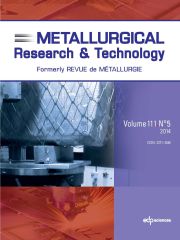Article contents
Effect of thermodynamic interactions on the rapidsolidification kinetics of Ni-Cu-Co alloys
Published online by Cambridge University Press: 28 March 2014
Abstract
Most theoretical work on solidification focuses on dilute binary alloys, while thosecommonly used in industry are multi-component with high solute concentrations. Inconcentrated alloys, the diffusion of one component will be inevitably influenced by theothers, which will further affect the rapid solidification kinetics. Assuming localnon-equilibrium at the solid/liquid (S/L) interface and in the bulk liquid, the kineticsof planar interface migration and dendrite growth in strongly non-equilibriumsolidification of Ni-Cu-Co alloys is comparatively studied. It is found that, for planarinterface kinetics, the thermodynamic interactions lead to a non-monotonic tendency of thepartition coefficient of Co with a slightly lowered interface temperature. Meanwhile, fordendrite growth (i.e. curved interface), the curvature effect and the thermodynamicinteractions together result in the non-monotonic variation of partition coefficients. Dueto the lowered dendrite tip temperature as a result of the thermodynamic interactions,larger undercooling is needed for interface migration and the dendrite growth is sloweddown.
Information
- Type
- Research Article
- Information
- Copyright
- © EDP Sciences 2014
References
- 4
- Cited by

